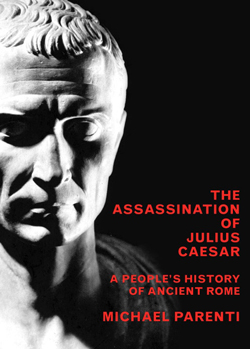The Gory That Was Rome

The Assassination of Julius Caesar
A People’s History of Ancient Rome
By Michael Parenti
New Press
276 pages
$24.95
History repeats itself. More accurately, historically, trends repeat themselves. In human and animal behavior there are repeated patterns.
The circumstances around the death of Julius Caesar can be seen as illustrating some of these patterns.
Today, 2054 years after Caesar’s death, most people know him from movies, high school history, or a Shakespeare play. None of these sources typically explain in depth the motive for a group of the Roman Empire’s most powerful politicians murdering Caesar gangland-style before witnesses in the senate.
What any particular group of people have for an understanding of any particular aspect of history depends on what they have read. The content of what they have read depends on who wrote it.
Roman history was written by an educated, elite class with the time to spend doing it. They read or listened to events recorded by the same class of individuals – the wealthy ruling class.
Until the 1960s a lot of history was written from a similar bias. The authors may not have been all drawn from the elite class, but they drew on, and wrote to that tradition.
Rome’s most famous historian, Cicero, was also a senator, the owner of vast estates, slaves, multistoried tenements crammed with tenants, and he was one of the estimated 2,000 families who effectively controlled the entire Roman Empire. It was Cicero’s spin on the glory that was Rome which has come down to us.
Michael Parenti is one of the contemporary historians who, along with historians like Howard Zinn, has scraped the frosting off this history cake to reveal the worms inside. Parenti, the author of 17 books, refers to his book as “A People’s History”.
Parenti rigorously critiques what he calls the “gentlemen historians”. These were historians who characterized the Roman commoners as a parasitic mob who lived only for bread and circuses. Parenti reveals a story of popular resistance against entrenched power and wealth.
In history texts and Shakespeare’s play, Caesar is characterized as a soldier who died in a feud or a constitutional struggle. Parenti shows that Caesar was one in a line of reformers who were murdered by “opulent conservatives.”
The empire was built on removing people from their land, working it with slaves and plebs, collecting rent, high taxes and tribute, and the consolidation of power. While usury reined, debt could easily be paid by selling oneself into slavery. By the time of Caesar’s death about 30 percent of “the Republic’s” population were slaves. For the ruling elite, with no other visible means of support, talk of land reform among the upper echelon of Roman society was the kiss of death.
Parenti’s research shines a light on the daily life of the average Roman. From the money-driven elections, struggles for economic democracy, the use of religion as an instrument of social control, plundered provinces, death squads, and witch hunts to the civil war that followed Caesar’s death. The glory that was Rome remains a myth throughout.
Parenti’s history has Caesar’s assassination setting off a civil war, the crumbling of the 500-year-old republic, and the establishment of an absolutist rule that prevailed over Western Europe for centuries.
It’s up to the readers of The Assassination of Julius Caesar to decide whether they see any repeating trends or patterns of animal behavior.
